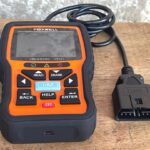Heavy-duty trucks are the backbone of many industries. Maintaining their peak performance and minimizing downtime is crucial for productivity and profitability. An Obd2 Scanner For Trucks provides a window into the vehicle’s health, enabling diagnostics, performance monitoring, and proactive maintenance. This article explores the capabilities of OBD2 scanners for trucks and how they can benefit owners and operators.
Understanding OBD2 Scanners for Trucks
OBD2 scanners for trucks, like those for cars, connect to the vehicle’s onboard diagnostics system via the OBD2 port. This port allows access to a wealth of data from various sensors throughout the truck, including engine performance, emissions, transmission, and more. However, trucks often require specific protocols and adaptors for proper communication.
Key Features of Truck OBD2 Scanners
Modern OBD2 scanners for trucks offer a wide range of functionalities beyond basic diagnostics:
- Fault Code Reading and Clearing: Identify and clear Diagnostic Trouble Codes (DTCs), providing insights into the root cause of malfunctions. This allows for targeted repairs and avoids unnecessary downtime.
- Live Data Monitoring: View real-time data from various sensors, such as engine RPM, coolant temperature, fuel pressure, and exhaust gas temperature. This information helps monitor engine performance and identify potential problems before they escalate.
- Performance Monitoring: Track key performance indicators (KPIs) like fuel consumption, acceleration, and braking performance. This data can be used to optimize driving habits and improve fuel efficiency.
- Emissions Testing Readiness: Check if the truck’s emissions system is functioning correctly and ready for emissions inspections. This ensures compliance with environmental regulations and avoids potential fines.
- Fleet Management Integration: Some advanced OBD2 scanners can integrate with fleet management systems, providing real-time data on vehicle location, driver behavior, and maintenance needs. This improves operational efficiency and reduces costs.
- Customizable Dashboards: Many scanners offer customizable dashboards, allowing users to select and display the data most relevant to their needs. This personalized view provides quick access to critical information.
Choosing the Right OBD2 Scanner for Trucks
When selecting an OBD2 scanner for trucks, consider the following factors:
- Compatibility: Ensure the scanner is compatible with the truck’s make, model, and year, as well as the specific protocols used by heavy-duty vehicles (e.g., J1939, J1708).
- Functionality: Determine the required features based on specific needs. Basic code readers are sufficient for simple diagnostics, while more advanced scanners offer live data monitoring, performance tracking, and fleet management capabilities.
- Connectivity: Choose between wired and wireless (Bluetooth or Wi-Fi) connections based on preference and convenience.
- Software and Updates: Opt for scanners with user-friendly software and regular updates to ensure compatibility with the latest vehicle models and regulations.
- Durability: Select a rugged and durable scanner built to withstand the demanding environment of trucking operations.
Benefits of Using an OBD2 Scanner for Trucks
Investing in an OBD2 scanner for trucks offers several advantages:
- Reduced Downtime: Quick and accurate diagnostics enable faster repairs, minimizing downtime and keeping trucks on the road.
- Improved Maintenance: Proactive monitoring helps identify potential issues before they become major problems, reducing costly repairs and extending vehicle lifespan.
- Increased Fuel Efficiency: Monitoring fuel consumption and driving habits helps optimize performance and reduce fuel costs.
- Enhanced Safety: Early detection of mechanical problems improves safety by preventing breakdowns and accidents.
- Compliance with Regulations: Ensure trucks meet emissions standards and avoid potential fines.
Conclusion
An OBD2 scanner for trucks is an essential tool for owners and operators seeking to maximize performance, minimize downtime, and improve profitability. By providing access to critical vehicle data, these scanners empower informed decision-making regarding maintenance, repairs, and operational efficiency. Choosing the right scanner and utilizing its features effectively can significantly enhance the overall performance and longevity of heavy-duty trucks.

